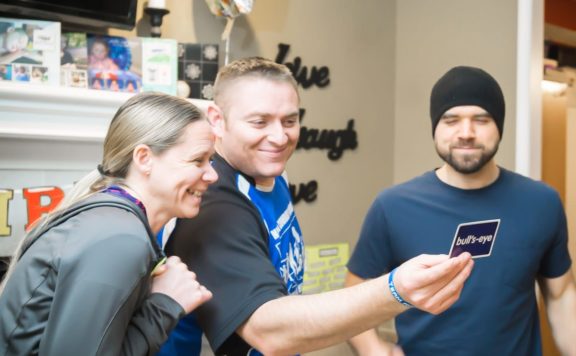The online poker world is an interesting place. Even though all variants, including Hold’em and Omaha, have money at their core, you can play for free. Through a combination of freerolls and play money tables, you can actually learn the basics without spending any cash. In fact, playing online poker for free is something every novice should do before they make a deposit.
However, can you really go from beginner to semi-skilled player with free games? As we’ll discuss, free poker tournaments aren’t exactly the same as their real-money counterparts. Because players don’t have the same financial pressures, the dynamics tend to be slightly different. Now, this doesn’t mean you can’t improve by playing freerolls. The trick though is to know what you’re doing and, in turn, how much knowledge you can actually glean from these games. In the following sections, we’ll show you what we mean.
Online Poker Freerolls: Play and Win for Free
Before we dive into the ways freerolls can make you better at poker, we need to define what they are. If we exclude play money poker tables which are similar to free iOS games because they don’t offer real money prizes, freerolls are tournaments you don’t have to pay for. When you scroll through any online poker site, you’ll see hundreds of MTTs (multi-table tournaments) with varying entry fees.
Freerolls are a type of MTT that doesn’t have an entry fee, hence the name. Naturally, there are some additional points to consider when you’re looking for freerolls. As outlined by 888poker in its guide to online poker, these tournaments are usually open to everyone. However, you often have to meet “certain qualifications” before you can play. For example, a site may offer a freeroll to everyone that made a deposit within the last 30 days. Alternatively, an event might be open to all new players.

These types of conditions are in place to encourage some activity. Although poker operators are happy to host free MTTs, they do want something in return. Whether it’s a show of loyalty or something else, there is a bit of give-and-take in these situations. But, even though you may have to meet certain entry conditions, the fact remains that you’ll never have to pay to play.
That’s great, but freerolls are only attractive if they offer some sort of prize. Again, as outlined by 888poker, these tournaments give you a way to “win real money” without risking your bankroll. Although the prizes will vary, it’s often the case that free MTTs give the top finishers either cash (not bonus cash) or a prize (i.e. entry to a bigger tournament). These incentives are what make freerolls so popular and, in turn, a great way to learn more about the game.
Strategies that Work in Freerolls and What You Can Learn from Them
Perhaps the most important thing you need to understand about freerolls is that players rarely fold. Because they aren’t risking any money, they have a fearlessness that wouldn’t be there if: A) they knew more about poker strategy and B) they had to pay $500 at stake. With this being true, you have to adjust your strategy accordingly.
In fact, the biggest lesson you can take from freerolls is that bad players don’t fold if they have a draw or a pair. Obviously, this isn’t always true. However, if we’re giving you some advice on how to use these games to improve, it would be bluff less. We’ll cover this more in the final section, but the best way to use freerolls is to develop a tight style. To put it another way, you need to focus on the value of your starting hands and only bet strong when you have something.
Although this may seem like a weak strategy, it’s one that will actually help you navigate the early part of your career. Once you’re comfortable playing strong hands, only then can you start manipulating situations and bluffing people. Freerolls are an excellent way to hone this skill because players rarely fold which means you have to read the situation and correctly ascertain whether your hand is going to be good at a showdown or not.
Tips for Playing Poker Freerolls
Beyond using freerolls to bolster your hand reading abilities, you can use the following tactics to improve your potential success rate:
- Don’t Be Afraid to Limp: Because players rarely fold, there’s no point raising pre-flop with hands such as suited connectors (i.e. 6s and 7s). You can, however, limp into pots because you’ll rarely have to call a raise from someone else.
- Don’t Bluff: We’ve hinted at it already but bluffing shouldn’t be part of your overall strategy. Yes, there could be times where it will work. However, don’t rely on this move.
- Bet Big with Big Hands: Once you’re dealt a strong pre-flop hand or you make something post-flop, bet big. Even if it’s more than the pot, go for broke. Because players are willing to call with relatively weak holdings, you need to extract maximum value when you’re strong.
Bluffing in Freerolls: It’s Not as Important as You Might Think

To finish our look at freerolls, the final point we want to reiterate is that bluffs don’t typically work in these games. Because players don’t have any financial pressure, they’re happy to call you down with bottom pair. In contrast, a professional would be willing to fold bottom pair if you told a convincing story. Therefore, the wider lesson here is that bluffing isn’t something you should do too often.
Regardless of whether it’s a freeroll or the World Series of Poker (WSOP), bluffing is a much smaller part of tournaments than many players assume. Of course, as you face better players like Canada’s Daniel Negreanu, bluffs will become more common. However, in low stakes games, you should try to avoid them. If you can do that, play strong hands and learn how to read your opponents, freerolls are a great way to enhance your skills at the felt.







